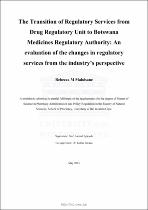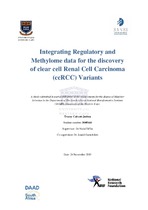The transition of regulatory services from drug regulatory unit to Botswana medicines regulatory authority: an evaluation of the changes in regulatory services from the industry’s perspective
Abstract
The Drug Regulatory Unit (DRU) was established by the Ministry of Health (MoH) to enforce the Drugs and Related Substances Act of 1992 in line with the Botswana National Drug Policy (BNDP) adopted in 2002 and the National Health Policy (NHP) to attain health for all. However, as with many National Regulation Authorities (NRAs) in low and middle-income countries, the DRU had major challenges in inefficient legislation and regulation to address the supply of substandard and falsified medicines, and financial and human resource constraints to maintain and sustain regulatory oversight. The Government of Botswana through the MoH restructured DRU into a semi-autonomous regulatory body, Botswana Medicines Regulatory Authority (BOMRA). To aid the NRAs in building and strengthening regulatory systems' capacity to regulate medicinal products effectively and efficiently, the World Health Organization (WHO) has generated a Global Benchmarking Tool (GBT) for member states. As of December 2019, a total of 26 countries underwent formal benchmarking while 54 countries including Botswana completed self-assessments using the WHO-GBT. Despite this self-assessment, there might be a need to assess the efficiency of the regulatory service delivery of BOMRA from the industry’s perspective. The study aimed to assess and compare the changes in the regulatory system for the WHO-recommended regulatory functions and service delivery following the transition of DRU to BOMRA from the industry’s perspective.
Collections
Related items
Showing items related by title, author, creator and subject.
-
Integrating regulatory and methylome data for the discovery of clear cell Renal Cell Carcinoma (ccRCC) variants
Calvert-Joshua, Tracey (University of the Western Cape, 2015)Kidney cancers, of which clear cell renal cell carcinoma comprises an estimated 70%, have been placed amongst the top ten most common cancers in both males and females. With a mortality rate that exceeds 40%, kidney cancer ... -
A qualitative evaluation on the appropriateness of the current regulatory guidelines, on the manufacture of medicines within the radiopharmaceutical industry
Suliman, Zaahirah (University of the Western cape, 2016)The purpose of this research thesis, is to evaluate the appropriateness of the current regulatory guidelines on the manufacture of medicinal products within the radiopharmaceutical industry. The manufacture of radiopharmaceuticals ... -
Developing a regional competition regulatory framework in the Southern African Development Community (SADC)
Chapeyama, Salome (University of the Western Cape, 2015)This study aims to evaluate the prospective benefits and challenges of developing a regional competition regulatory framework in SADC. Further, the study seeks to identify important lessons from the EU and COMESA that ...




